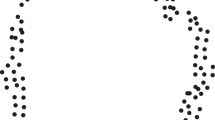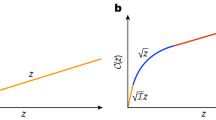Abstract
IT is well known that the law of iso-morphism discovered by Mitscherlich is now accepted with considerable limitations. Marignac, for example, showed long ago that the compounds ZnTiF6, 6H2O, ZnCbOF5,6H2O, ZnWO2F4,6H2O, though homomorphous and capable of forming mixed crystals, are not identical in chemical formulæ. It is to be assumed that there are not only homologous elements but also homologous radicals. The ability to form mixed crystals, homomorphism, and identity of chemical formulæ are not necessarily co-existent. But when certain elements or radicals can be substituted totally or partially in very different salts, the analogy of these elements or radicals remains undisputable and makes legitimate the parallelism of chemical formulæ.
This is a preview of subscription content, access via your institution
Access options
Subscribe to this journal
Receive 51 print issues and online access
$199.00 per year
only $3.90 per issue
Buy this article
- Purchase on Springer Link
- Instant access to full article PDF
Prices may be subject to local taxes which are calculated during checkout
Similar content being viewed by others
Author information
Authors and Affiliations
Rights and permissions
About this article
Cite this article
RÂY, P. Isomorphism and Homology. Nature 124, 480–481 (1929). https://doi.org/10.1038/124480b0
Issue Date:
DOI: https://doi.org/10.1038/124480b0
This article is cited by
-
The genesis and movement of the Nor’westers of bengal
Proceedings of the Indian Academy of Sciences - Section A (1952)
-
Isomorphism and Chemical Homology
Nature (1931)
Comments
By submitting a comment you agree to abide by our Terms and Community Guidelines. If you find something abusive or that does not comply with our terms or guidelines please flag it as inappropriate.



